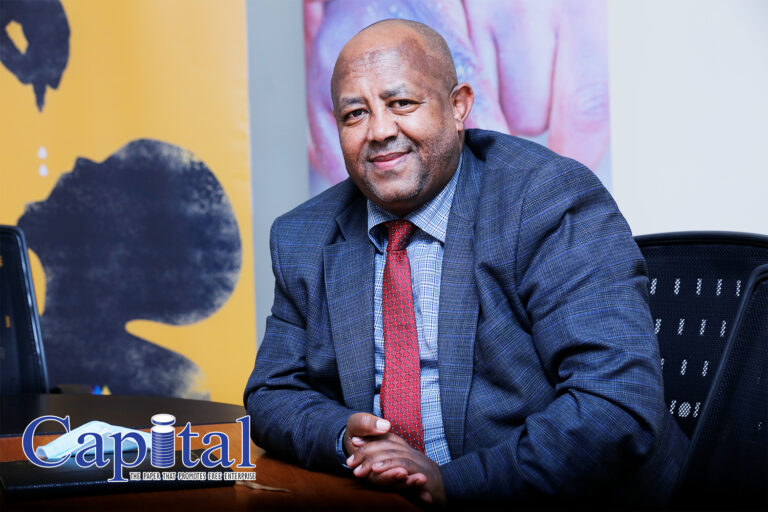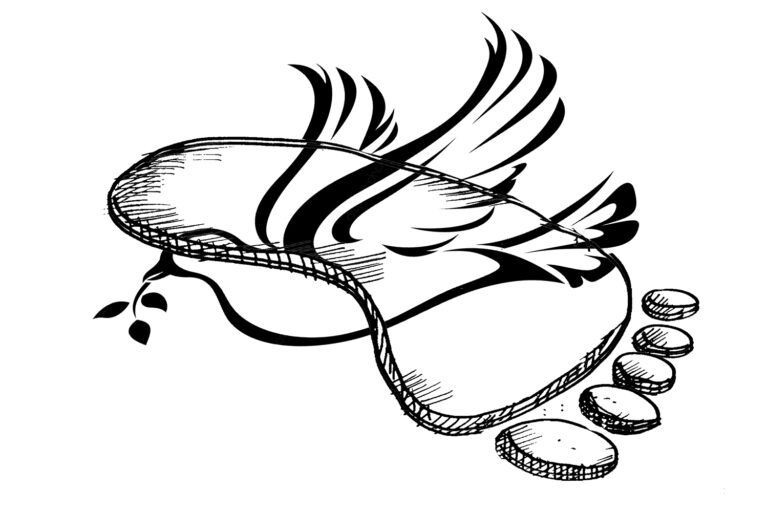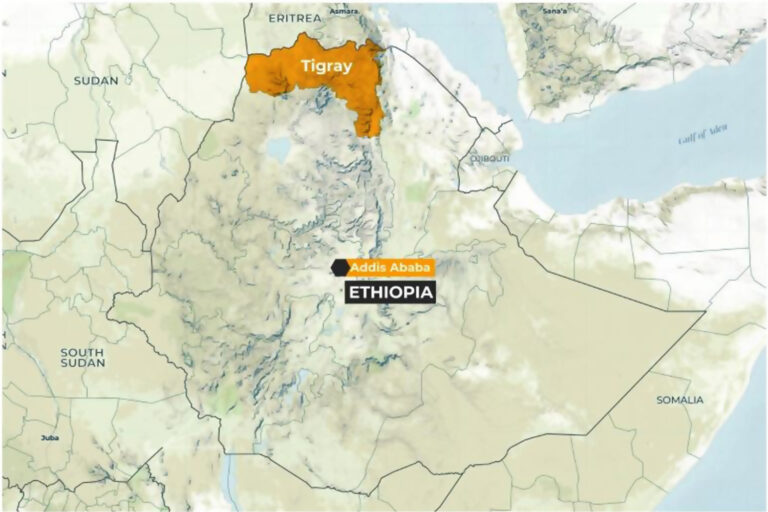In the last two years the new reformist government of the country has made different economic reforms that have made changes in the financial institutions such as banks and insurances. Experts have been giving their own suggestions regarding the reforms. Asseged Gebremedihn is an experienced manager with a demonstrated history of working in the insurance industry, skilled in System Monitoring, Technical Assistance, Management, M&E, and Project Management. Strong professional he earned an Executive Master of Business Administration (EMBA) focused in Business Administration and Management, from Addis Ababa University. Currently Asseged is Deputy Chief executive officer of Global Insurance Company which is one of the oldest insurers in the country. Capital talked Asseged about the current structure of insurance companies in the country. Excerpts;
Capital: What is your view on the development of the insurance sector in the country?
Asseged Gebremedihn: Ethiopian finance sector is a century old sector and the insurance sector has been operating for half century and has passed in different ideologies. Ethiopian insurance company, the first insurer, was established in 1976. In the imperial period, foreign private insurance companies had been supplying the service which follows the developed world insurance policy. In 1987 when the sector opened for private investors other insurance companies started to get in and operate in the sector.
The development of the sector can be described as latent since it cannot be said that the insurance sector has developed as it did in the beginning, as it has less contribution to the total GDP of the economy which is 370 billion. Insurance companies do not even represent 10 percent of that contribution. The general growth premium is about 11 billion birr which is really a small share in the East Africa share. Insurance in Ethiopia is controlled under the national bank regulations. Some expertise suggests this has also blocked the sector’s development whilst others suggest that the market is free for competition and there are representatives at the board.
Also recently, following the economic reforms in the country which is becoming more liberal, there are certain movements which could have positive effects on the development of the sector.
Capital: Recently, the National Bank of Ethiopia has published different directives regarding to the insurance sector including the investment share directive. What are your views on the regulations?
Asseged Gebremedihn: Insurance company proclamation and directives have for the last 20 years been stagnant, that is, no insights were done for the past two decades. However, recent reforms of the government have resulted to more liberalization and transformation which can have better effect on the development of the financial sector. Government is on process of liberalizing its development organizations and Ethiopia is going to be a member of the world trade organization. Following this, government is in a transforming and

liberalizing mode. The economy, insurance and banks could be more effective in liberalized markets, since it creates competition among the actors. National bank investment directives states that one financial institution to have healthy operations, they should have enough hedge capital before investing.
Currently insurance companies invest only on three sectors, namely; fixed time deposit, buying treasury bills and on real-estate sector. This helps to increase their asset by participating in long term investment however this is not enough as the stated investments are becoming more of traditional options. However, it would be better if the investment policy is linked with the national budget allocation and economic growth of the country. Since the economic and the population size is increasing , Ethiopia’s regional integration and role in east Africa is developing, insurance companies investment should not be specifically limited on only the three. The more relaxed liberal market system would increase short term and long term investments options to insurance companies. For example, in short term investment capital market is on the rise so they can be profitable by investing on short term investment on the other hand, life insurance pension fund which is long term investment options and also on real-estate development by creating what is called friendly societies is also profitable. Banks and insurers may also invest money on high profitable options. Share companies are increasing in the market so insurance companies can invest on this. Therefore, being cognizant of these factors we should have a wider approach to investing. The three traditional investment options are becoming old investment options especially when inflation rate is increasing. Therefore, investments should have greater return than the inflation rate otherwise it is not a good option. Thus it is clear that different investment portfolios should be designed to engage the insurance companies.
Ethiopian insurance landscape is changing after the new leadership under Prime Minister Abiy Ahmed came to the power. For example, recently, someone who has patent can get loan from the bank to make the innovative idea real and insurance companies also give insurance guarantee. Moreover, there is a huge potential for cattle and livestock because livestock has been set as a moveable property so banks can give loans and insurance companies can give insurance coverage. This is a major shift on the sector since more than 80 percent of our population is depending on agriculture and cattle. This is a major shift for both sectors, that is, the insurance and the agriculture since investment is being increased.
Now days there are some hopeful new freedoms that will allow us to work with small business and agricultural companies, and since more than 80% our economy is based on agricultural business it’s a win-win for both parties. Furthermore, competitive and preferable banking systems are also in the market i.e. Islamic banking systems. Merchants who have high influence in the business sector and have a reserved approach to insurance systems because of their religious beliefs have also been addressed to by our insurance. Our insurance company provided the first insurance service called ‘TAKAFUN’ and since its launch it has grown to a 1.3 million economy size. In this system, if you buy the insurance service it will allow the user to become a shareholder. In conventional insurance risk is transferred to the insurance whilst in TAKAFUL the risk is shared. The participants share risks according to the mutuality and they build their own plan that is called ‘mutual protection’. They can also place the risk in interest free banking governed by sharia laws. Since interest free banking is existent in Ethiopia, any business can get this service.
Capital: In recent times, establishment of ethnic and religion based financial institutions is becoming familiar do you think this could have a positive impact on the sector?
Asseged Gebremedihn: Establishment of ethnic and religion based financial institutions can be in some ways tactful and also impactful to the great majority. These establishments can consider the financially ignored so to speak. Branding has its own impact, for example when you say ‘GLOBAL’, the name itself indicates that our company is inclusive.
Some firms choose to put country names in their names and this in some instance shows their target group. For example interest free banking was linked with the Islamic religion but we see that Christians will likewise use the service. Therefore it may appear to be limiting in target groups but it may also bring a common ground of addressing services.
The world is increasingly becoming competitive and any start up bank and share companies should consider their company name strategically, because the business has international touch in nature. All indications in business show that we are operating in a global arena. Our company also acknowledges this thus we are all inclusive as we strive to be internationally competitive.

Inclusivity is key and essential. We all are worki9ng towards the 2030 vision and when we see our country in comparison to other such as our neighbors in East Africa, they have a huge banking industry in terms of for example turn over and technology.
Therefore naming should note be done to discriminate or alienate but to bring inclusion so as to grow both the company and the economy.
Capital: In the developed world the role of insurance companies on risk management and assessment is high, how do you see this in our country’s context?
Asseged Gebremedihn: The role of insurance companies on risk management assessment, in developed countries is to make a big influence in their county`s fundamental risk. They provide individual consulting services as they magnify the risks, look into fidelity factors and also disaster incidents in their analysis.
Personally, in Ethiopia insurance industry history there is not much practical work assessment and researches on the predictable huge risks which may happen in the country. But focus must shift to this research and assessment. I recall 7 years back in Dire Dawa there were huge floods that led to great losses. Also around Kolfe, there was a huge incident and we lost 123 people and more so recently the huge floods in Tana have been tragic. The government must therefore work to provide a strategy that is through including it in the research and assessment in its annual budget strategy. The government should work therefore cohesively with insurance companies before the damage happens. This cohesiveness has worked in countries such as England too.
Insurance association’s and professionals associations must also look into updating their system in alignment with leading global systems on their relevant business sectors as they seek to provide input to their stakeholders on risks. These data analysis will go a long way in aiding the insurance companies.
As insurance we are also working in pre-risk assessments such as fire accidents if a company wants to buy insurance we will assess the pre-risk by fire engineers on what the physical hazard could be, how the work flow looks like, the production process, safety and we give a reporting on the same.
We also provide PVT (Political Violence and Terrorism risk), like political dissections like tax change, currency change, terrorist attacks and instability or unrest. These pre-risk aids on getting business back to business when such cases arise. This goes to minimize potential future damages.
I personally recommend and encourage that for the overall insurance industry to grow focus of risk management and assessment should really be tackled in academic institutions so as to create more awareness at the grassroots level. Furthermore, we should all consider the benefit of insurance in our day to day lives and business.






